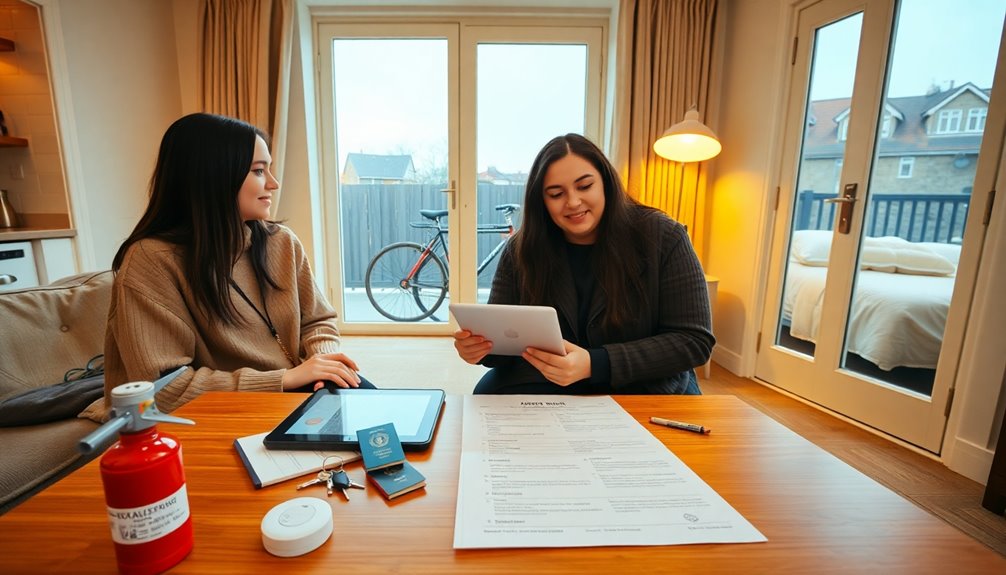
When studying English in Ireland, pick a neighborhood that fits your routine and budget so you’re near campus, cafés and nightlife or quiet study spots. Prioritize shared flats or student residences for affordability, check heating and internet, and use university housing resources. Test commute times at peak hours and scout local shops and transport links. Read lease terms closely, document the inventory, and agree house rules with flatmates. Keep going to find practical checklists and examples.
Highlights
- Choose accommodation near campus or transit to minimize commute and maximize time for classes and self-study.
- Pick lively neighborhoods or homestays to practice English daily with locals and fellow students.
- Prioritize affordable shared flats or student residences with reliable internet and quiet study spaces.
- Read and understand your lease, deposits, and house rules before signing to avoid tenancy issues.
- Screen flatmates, agree on chores and noise rules, and visit at different times to ensure a safe study environment.
Choosing the Right Neighborhood for Student Life in Ireland
Where in Ireland you choose to live will shape your daily routine, budget, and social life, so think about what matters most — commute time, safety, nightlife, or quiet study spaces. You’ll want a neighborhood that matches your pace: lively districts offer late social activities and easy language practice, calmer areas give focused study hours and restful nights. Check transport links, proximity to campus, and costs, but also scout spots that reflect local culture so you can immerse freely. Talk to current students, visit at different times, and prioritize places that support both learning and the independent life you want.
Finding Affordable Accommodation Close to Campus
Once you’ve picked the kind of neighborhood that fits your lifestyle, the next step is finding affordable accommodation close to campus without sacrificing safety or study-friendly features. You’ll want to prioritize shared flats, student residences, or homestays as practical budget options that keep costs down and routines flexible. Use university housing resources, trusted local portals, and student forums to compare listings and verify deposits. Visit properties when possible, check heating, internet, and quiet study spaces, and ask about bills included. Negotiate lease terms for short stays, and trust your instincts—choose a place that supports both learning and independent living.
Assessing Transport Links and Local Amenities
Because you’ll be relying on public transit, walking routes, or a bike more than your car, check how long it really takes to get to campus at different times of day and whether schedules match your class and study hours. Also scout nearby stops, frequency, and night services so you won’t be stranded after late study sessions. Note where local shops, cafés and laundrettes are — they’re essential for daily freedom. Think about cycling lanes, safe walking paths and short detours that save time. Aim for a balance: efficient commutes, convenient amenities, and the flexibility to explore without feeling tied down.
Understanding Rental Contracts and Tenant Rights
Although rental contracts can look intimidating at first, you’ll want to read every clause carefully so you know your obligations and rights from day one. Focus on rental terminology like lease length, deposit, notice period, and utilities to avoid surprises. Check inventory and repair clauses so maintenance duties aren’t vague. Know tenant responsibilities for cleanliness, paying rent on time, and reporting damage—those protect your deposit. Learn how to end a contract and what lawful eviction looks like in Ireland. Keep copies of all documents and communications; being organized gives you freedom and confidence to study and explore without housing stress.
Tips for Safe Shared Housing and Roommate Selection

When you’re moving into shared housing, prioritise safety and compatibility from the start by screening potential roommates, checking the flat’s security features, and agreeing on clear house rules—this will cut down on conflicts and keep you feeling secure. Ask practical questions about work/study schedules, guests, cleanliness and bills, and meet people in person or via video. Inspect door locks, windows and alarms; confirm smoke detectors and secure storage. Draft simple roommate agreements covering rent, chores, visitors and dispute resolution so everyone knows expectations. Trust your instincts, keep emergency contacts handy, and choose people who respect your independence.
Some Questions Answered
Can I Bring a Pet Into Student Accommodation in Ireland?
Generally no — most student accommodation in Ireland bans pets, though rules vary. You’ll need to check individual pet policies and request permission early; some private landlords may allow small animals or consider emotional support needs with documentation. Be prepared to show vet records, references, or medical letters. If a pet isn’t permitted, look for pet-friendly private lets or temporary fostering options so you can study freely without breaking rules.
Are Utilities Usually Included in Student Housing Prices?
Usually not — whether utilities are included depends on accommodation types and the landlord. Private student halls often roll utility costs into rent for simplicity, while shared houses or private rentals may charge separately or split bills. You’ll want to check listings, ask about average utility costs, and clarify bills for heating, electricity, internet and water before signing. That way you keep control of your budget and freedom to choose.
How Do I Set up Internet and Mobile Service as an International Student?
You set up internet and mobile service by choosing local internet providers and comparing mobile plans before you arrive. Bring ID and your passport; you’ll often need an Irish address and proof of enrolment. Buy a pay-as-you-go SIM on arrival or pick a flexible monthly plan online. For home internet, book installation ahead or grab a temporary router. Keep receipts, register accounts, and contact providers if you need help.
Can I Change My Accommodation Mid-Semester if Needed?
Yes — you can often change your accommodation mid-semester if policies allow it. I once switched flats like swapping textbooks mid-term; it felt freeing and smoother than I feared. Check your provider’s accommodation policies for notice periods, fees, and mid semester flexibility. Talk to housing services, document agreements, and have backup options. You’ll want clear timelines and a deposit plan so the move stays practical, supported, and stress-free.
Do Landlords Require a Guarantor From Overseas Students?
Yes — landlords often require a guarantor for international students, especially if you lack local credit history. Landlord requirements vary: some accept a parent’s overseas guarantor, others want an Irish or UK-based guarantor, upfront rent, or a larger deposit. You’ll want to ask landlords or agencies early, provide proof of funds, enrollment, and ID. Stay proactive, flexible, and clear about what freedom you need in housing choices.
Summing Everything Up
You’ll juggle excitement and practicality as you pick a neighborhood that feels like home yet keeps classes close, balancing budget constraints with the freedom to explore. Know your rights and read contracts carefully, because confidence and caution go hand in hand. Pick roommates who respect quiet study times and shared chores, and map transport and amenities so daily life stays smooth. With smart choices and good communication, your Irish study stay can be safe, affordable, and unforgettable.
